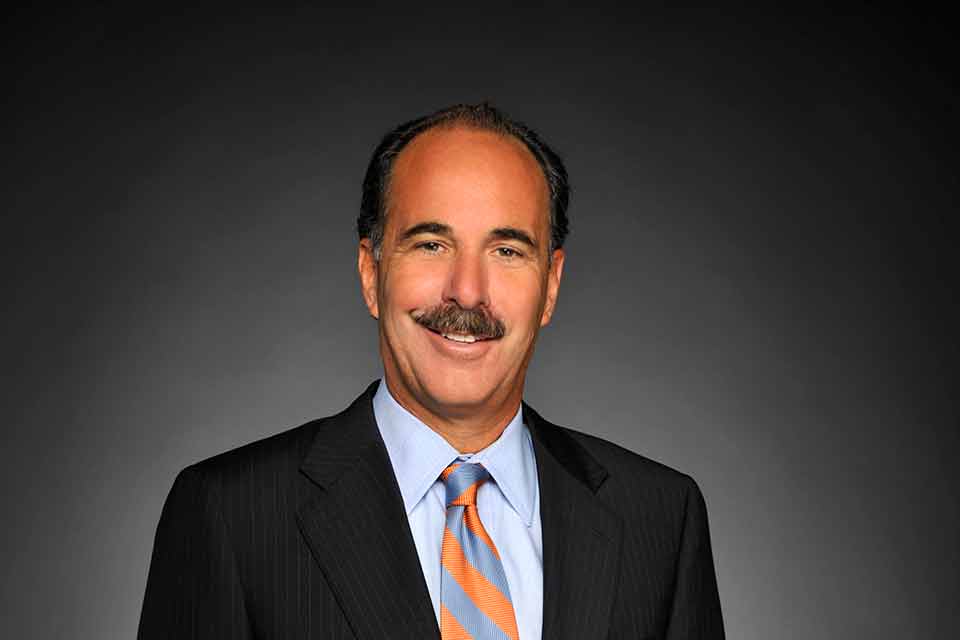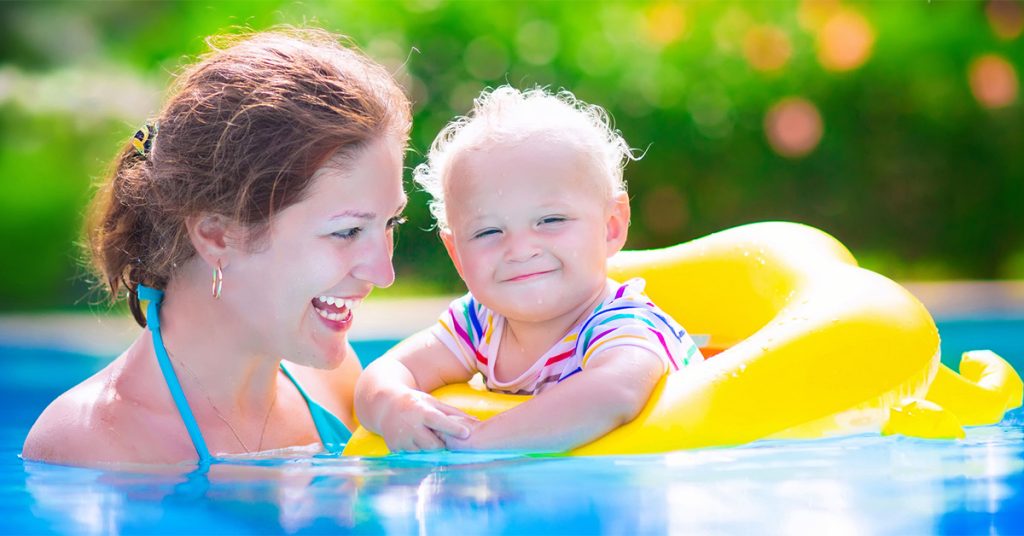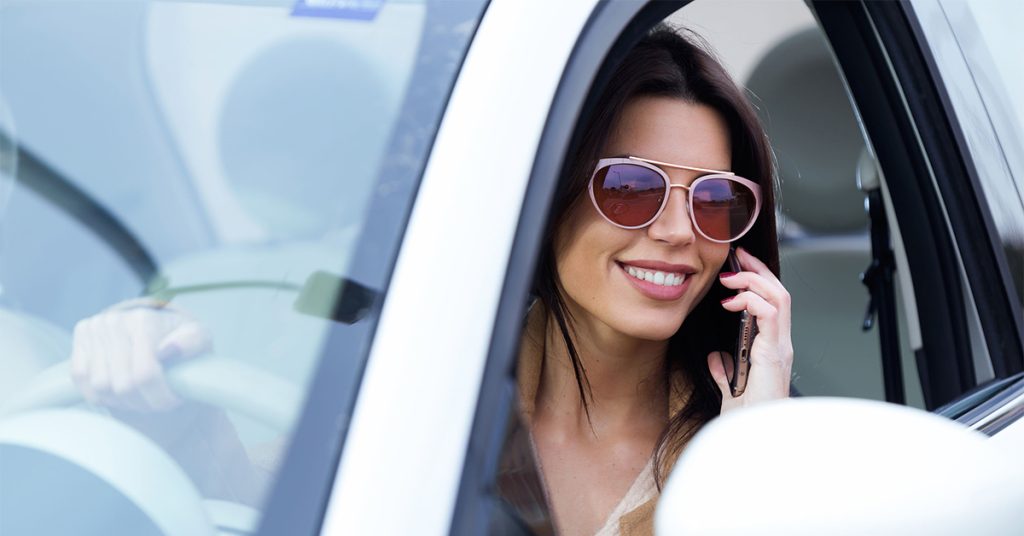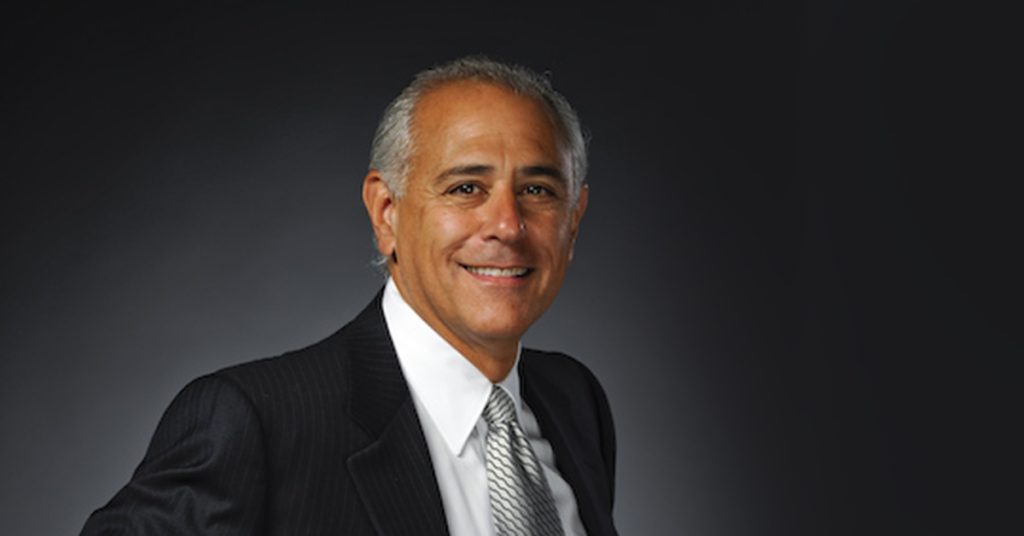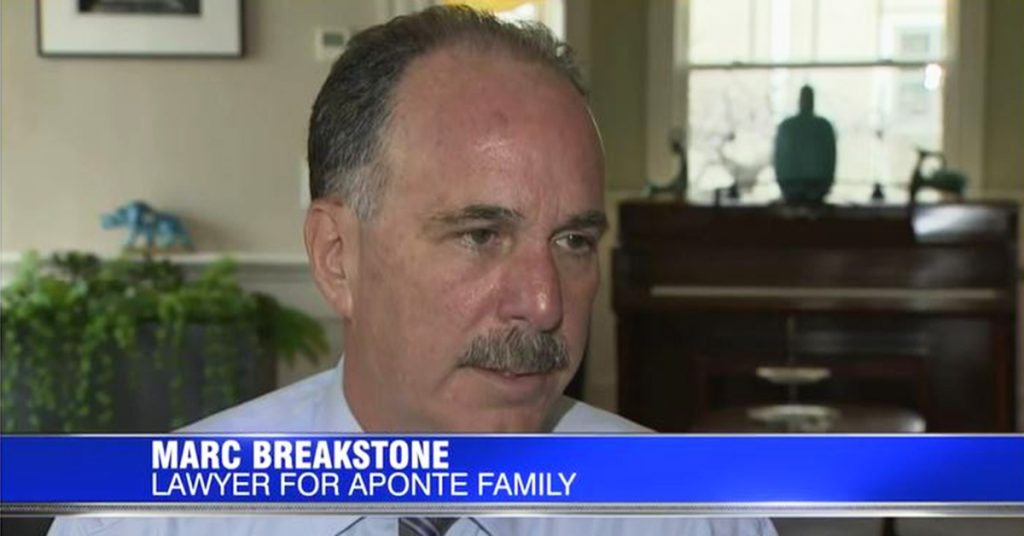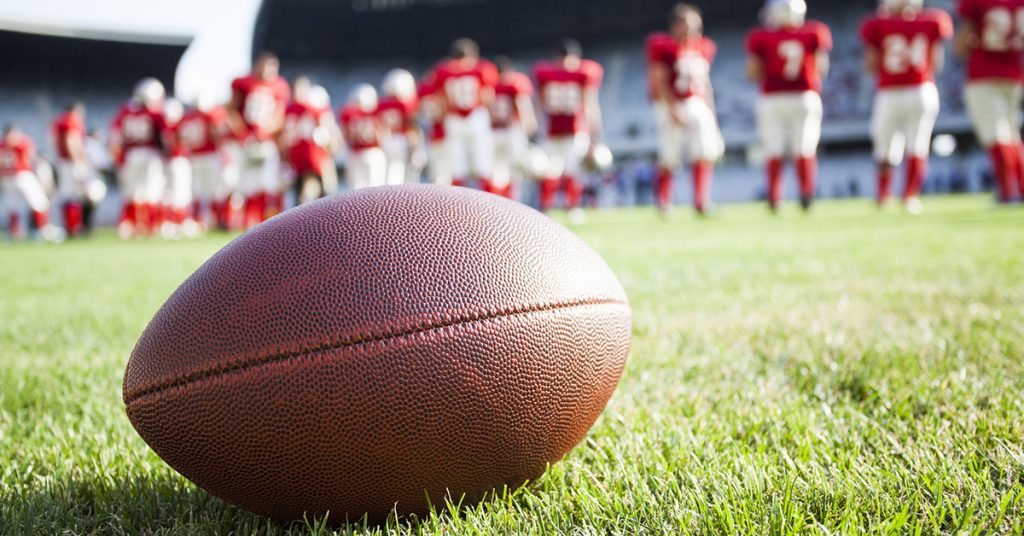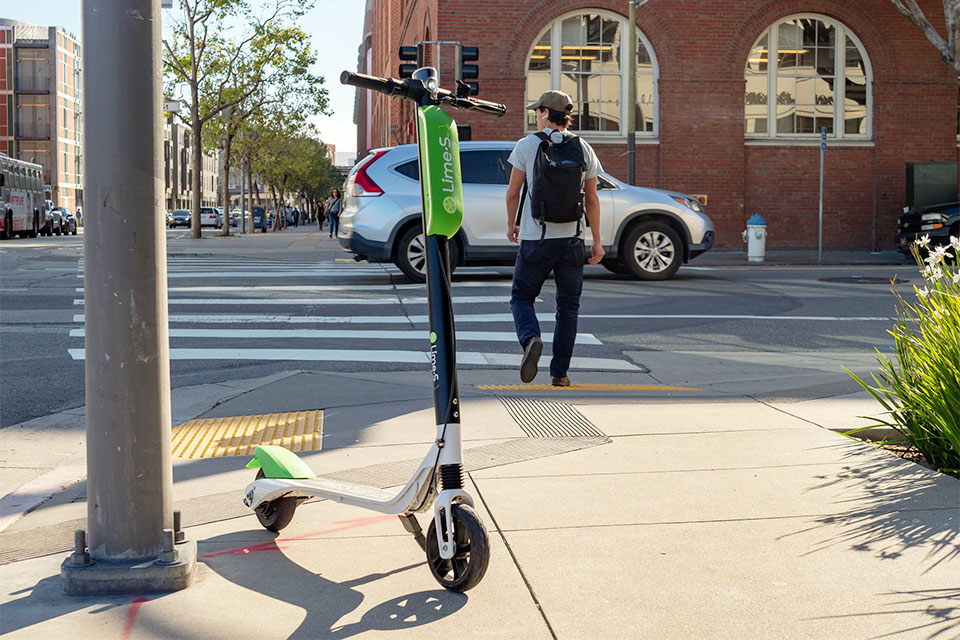Personal Injury
Attorney Marc L. Breakstone Tells Boston Globe: Kevin Spacey Civil Lawsuit is Over

Attorney Marc L. Breakstone was interviewed this past weekend about the civil and criminal cases against actor Kevin Spacey. Breakstone said the accuser’s decision to withdraw the civil lawsuit “with prejudice” is extremely significant.
“This will never be refiled,” Breakstone told The Boston Globe. “This claim is now extinguished for all time.”
The accuser, who is the son of former Boston television anchor Heather Unruh, just filed the civil lawsuit in Nantucket Superior Court on June 26. Breakstone said the withdrawal of the civil lawsuit could mean Spacey has reached a settlement with the accuser. If there is such an agreement, Breakstone said, there will likely be confidentially requirement to keep the details private and out of public view.
Spacey and his legal team are scheduled to return to Nantucket District Court this morning for a hearing in the criminal case. Breakstone said withdrawal of the civil lawsuit could jeopardize the criminal proceedings, but prosecutors interviewed by The Boston Globe insisted the civil case will not affect the criminal proceedings.
Kevin Spacey is a two-time Oscar winner best known for his role on “House of Cards,” a Netflix production. He played the character of Frank Underwood from 2013 through 2017, when he was charged with indecent assault and battery in Nantucket. Netflix kept producing the show, but cut ties with Spacey.
Spacey is accused of indecent assault and battery on Unruh’s son in July 2016 at Nantucket’s Club Car Restaurant.
About Breakstone, White & Gluck
The Boston personal injury lawyers at Breakstone, White & Gluck have over 100 years combined experience representing those injured by the negligence and wrongdoing of others. If you have been injured, learn your rights. For a free legal consultation, 800-379-1244 or 617-723-7676. You can also use our contact form.
Grilling Safety at Summer Picnics and BBQs in Massachusetts

The first rule of grill safety: never leave your BBQ unattended.
As we approach the Fourth of July, many of us have grilling on our minds, and all the delights of summer BBQs. If you plan to grill, we hope you enjoy, but please remember to follow the rules of safety at all times.
This is the time to plan, because as we enjoy friends and family, July is the peak month for grill fires, the weeks when nearly 20 percent of all grill fires across the U.S. happen, according to the National Fire Protection Association (NFPA). August is another high risk month, accounting for 12 percent of grill fires.
Though these fires are devastating and life-changing events, they don’t always make the news. But according to the Massachusetts State Fire Marshal’s office, there were 474 fires involving grills, hibachis and barbecues between 2014 and 2018. Nineteen civilians were injured and seven firefighters were hurt in the wreckage. Property damage totaled $3.8 million in losses.
Across the 50 states, firefighters responded to 10,200 home fires involving grills, hibachis and barbecues each year from 2013 to 2017. Ten civilians were killed and 160 were injured. Property damage resulted in $123 million in losses.
Grilling Safety Tips
Compiled From the Massachusetts State Fire Marshal’s Office and Other Sources
- Only use propane and charcoal grills outdoors.
- Never leave your grill unattended.
- Keep a fire extinguisher nearby.
- Grills should be set up at least 10 feet away from the house or deck railings.
- Gas grills can be used on first-floor decks and patios, but they must be located on the ground level or have an outdoor stairway leading to the ground.
- Grills should never be set up under a roof overhang or low-hanging tree branches.
- Grills should not be used on fire escapes.
- Take additional precautions around children. Keep matches and lighters out of their reach. Create a circle of safety, keeping children and pets at least three feet away (more space is better).
- Do your grilling at least three feet away from tables and furniture. Fold grill covers and remove them from the cooking area.
Safe Handling of Propane Tanks
- Never smoke while handling or cooking with a propane cylinder.
- Keep propane tanks outdoors at all times, at least 10 feet distance from doors and other building openings. This includes windows and dryer vents.
- Keep propane tanks at least 20 feet from air intake vents and ignition sources.
- Propane cylinders should be stored outdoors in shady areas. Cylinders should not be used or kept in high temperatures.
- Replace propane cylinders that are aging, rusting or showing other wear and tear.
Charcoal Grills
- As with other grills, only use charcoal grills outdoors.
- When using charcoal grills, only use charcoal starter fluid. Never use gasoline or kerosene.
- Never add lighter fluid to hot coals. This can cause a flash fire, causing serious skin burns.
- Use charcoal grills in open outdoor decks and patios, just as you would gas grills. Be aware that charcoal briquettes emit carbon monoxide, a clear, odor-free gas which can accumulate in spaces and be deadly. Charcoal grills should never be placed in close quarters near an open window.
- Allow the grill to cool. After 48 hours pass, you can safely dispose of coals.
- If you cannot wait 48 hours, soak the coals in water, then place them in a metal container.
Maintaining Grills
- Review the product manual and instructions that come with your grill.
- Start by opening your grill to see if there is any animal activity or unexpected conditions.
- Next, check that your propane tank is safe for use. Dab soapy water on your propane tank and turn it on for a moment. If there is bubbling, you may have a potential leak. This should be done carefully. Before you try, watch a National Fire Protection Association video.
- Check that connections are tight before you turn the gas on.
- Clean the grease trap every time you grill.
Rooftop Grilling
Rooftop grilling is against the law in Massachusetts. When someone tries to grill on a rooftop, the damage can be deadly and exponential. Some may still remember the 2010 gas grill fire explosion that exploded and lit up the sky over Charlestown. Starting the fire was an illegal propane tank which exploded on a residential building’s rooftop. Soon after, three other illegal gas tanks burst nearby, igniting a 4-alarm blaze which move through several buildings.
Firefighters – 125 in all – battled the fire on a 100-degree Boston day. Nine firefighters and two civilians were treated for heat exhaustion injuries.
Maintain Safe Decks and Porches
Grill fires can happen when someone makes a mistake while cooking, when a child gets too close to the grill or if the grill has a product defect. Landlords may be held responsible in certain grill fires if they keep a defective grill or fail to meet building codes and illegally close off access ways. In Massachusetts, most residential properties are also required to have working smoke alarms on each floor of floor, including inside bedrooms and other areas. They must also have working carbon monoxide detectors.
You cannot always prevent negligence in these situations. But you may be able to minimize many injuries by providing yourself a little more room to work and taking it slow. Keep the grill area and walkways leading there open and clear. When you take grill covers off, set them in safe areas away from the grill. Finally, tell everyone in your home you are grilling and ask another adult to watch children.
Sources for this blog include:
Grilling Safety, Mass.gov
Getting Fired Up for Grilling Safety, Massachusetts State Fire Marshal’s Office
National Fire Protection Association
About Breakstone, White & Gluck
Breakstone, White & Gluck is a Boston personal injury law firm with expertise in premises liability and product liability cases. With more than 100 years combined experience, our attorneys have been recognized as top-rated personal injury lawyers in Massachusetts. Through our Project KidSafe campaign, we also work to bring safety information to individuals and families to help them make safe choices.
If you have been seriously injured by the negligence of someone else, learn your legal rights for seeking compensation. For a free legal consultation, contact us at 800-379-1244 or 617-723-7676 or use our contact form.
MBTA Derailments Cause Boston Commuters Injuries, Stress and Delays

The MBTA saw 43 train derailments over five years, many Green Line trolley derailments. (File photo: bwglaw.com)
Two MBTA subway derailments have injured over a dozen and shaken hundreds of Boston commuters over the past week. At least 12 of the injured passengers were transported to local hospitals. You are not alone if you are watching and wondering if Boston’s subways are safe for use.
According to news reports, the first derailment happened over the weekend (June 9, 2019), when a Green Line trolley derailed in a tunnel near Kenmore Square. This accident happened about 11 a.m. Police and firefighters aided 150 passengers off the derailed trolley and out of the dark tunnel. Another 500 startled passengers were evacuated from other trolleys along the Green Line. Eleven people were injured, with 10 people sent to local hospitals. The Green Line trolley operator was among those injured.
Soon after, The Boston Globe reported the train derailment was not due to aging infrastructure or equipment, but was “operator-related.” The MBTA suspended the 62-year-old operator pending the outcome of the investigation.
WHDH reported the operator had three years of experience operating trains. Meanwhile, The Boston Globe reported the train derailed after the outbound D Line train left Kenmore Square. The trolley operator approached a signal marking where the D and C lines split (near Beacon Street and Commonwealth Avenue). He kept traveling over a switch that was in the process of switching between the lines.
Then Tuesday morning (June 11, 2019), a Red Line train derailed near the UMass Boston campus and the John F. Kennedy presidential library. About 60 passengers were evacuated. Despite the terrifying scene, just two people were treated for injuries. One was treated for a hand injury at the scene. Another person initially left the crash scene, then returned, asking to be transported to a hospital for neck pain.
Crews were still working to repair the Red Line damage Wednesday, leaving hundreds of commuters without their usual way into Boston. The Red Line provides services through Quincy, downtown Boston and Cambridge. The line ends at Alewife station.
The 39-year-old operator has been taken off duty pending the outcome of the investigation, according to WHDH.
According to MBTA ridership figures, the red line carried 272,000 people daily in 2013. This makes it the busiest subway line. The Green Line was second, with 227,000 passengers. The Green Line and the Mattapan Line are the only light-rail trolley systems.
Unfortunately, MBTA train derailments are more common than the public may realize. The Boston Globe reports MBTA trains have derailed 43 times over the past five years. This is the second-worst safety record in the U.S.
Train derailments must be thoroughly investigated by an experienced lawyer. Causes can include operator error, cell phone use, texting or speeding. Aging infrastructure and equipment failure are other potential causes.
If You Were Injured in a MBTA Train Derailment
If you were injured, it is in your best interest to receive a medical evaluation from a hospital or your physician. Then consult an experienced MBTA accident lawyer and learn your legal rights.
With more than 100 years combined experience, Breakstone, White & Gluck is experienced in representing individuals who have been injured by the MBTA. Our attorneys have investigated and represented clients injured by Green Line trolley collisions, MBTA bus crashes and other accidents. We have also represented families who have lost loved ones in MBTA accidents.
For a free legal consultation, contact Breakstone, White & Gluck at 800-379-1244 or 617-723-7676. You can also use our contact form.
Safety Reminders to Protect Children from Swimming Pool Drownings
 Each year, families head into summer, hoping for fun in Massachusetts. No one expects tragedy in the backyard swimming pool. But each year, children suffer drownings and near drownings. Drowning is a leading cause of death among young children in Massachusetts and across the U.S. Young children ages 1 to 4 face the highest risk, followed by older children and teens between the ages 10 and 19, according to the American Academy of Pediatrics (AAP).
Each year, families head into summer, hoping for fun in Massachusetts. No one expects tragedy in the backyard swimming pool. But each year, children suffer drownings and near drownings. Drowning is a leading cause of death among young children in Massachusetts and across the U.S. Young children ages 1 to 4 face the highest risk, followed by older children and teens between the ages 10 and 19, according to the American Academy of Pediatrics (AAP).
Breakstone, White & Gluck, a Boston personal injury law firm, encourages parents and property owners to prepare for the swim season. By acting now, before the temperature rises, property owners and parents can minimize the risk of drowning and injury this summer.
For Pool Owners
Secure Pool Fencing
Pool owners have a responsibility to secure their pools with a strong durable fence. This is your legal responsibility and one of the most important steps you can take to prevent a child from a swimming pool drowning. The Consumer Product Safety Commission recommends pool owners install a four-sided fence with a self-closing latch around all pools and spas. The fence must be at least 4 feet tall in Massachusetts and must meet certain requirements for vertical clearance and width for fence openings. Read our past blog on pool fencing or check out this guide on a local community’s website.
If you own a pool, consider adding some additional fencing, shrubs or a planter – or several blocking access to your pool door and fence. This is called a “layers of protection” strategy and the goal is to slow children down so an adult can intervene.
Inspect Your Pool Regularly
Make it a habit to walk outside and inspect your pool daily during the summer months.
Pool Alarms
Consider purchasing a pool alarm to monitor your pool area. There are different types of alarms so do your research and select the best for your needs. But remember, a pool alarm is a supplement to your strong fencing and regularly inspecting your pool.
Drains
Pool owners should regularly maintain drain systems and ensure they work properly. Spas should be covered and locked when out of use. Children should never wear loose accessories into the pool.
For Parents
Swimming Lessons
Parents who sign children up for swim lessons give them an advantage. Formal swimming lessons reduce the likelihood of childhood drowning by 88 percent, according to the USA Swimming Foundation. The American Academy of Pediatrics advises that swim lessons are beneficial for children around age 1 and older.
Supervision: Always Watch and Avoid Distractions
Parents should swim with younger children, practicing “touch supervision.” Keep them within your reach at all times on the shallow end. Even if you are not in the pool with them, still closely watch other children and teens carefully at all times.
Keep conversation with other adults at a minimum when watching children swim. Also set aside all distractions, such as cell phones. It takes much longer than you may realize to “quickly” check your cell phone, e-mail or social media accounts. In that time, a child could drown right in front of you, quickly and silently struggling.
If you are a pool owner and have guests over, be just as vigilant in watching children swim. Try inviting over small groups – just a child or two – to enjoy your pool to keep the visit manageable.
Supervision: The Danger of “Non-Swim Time”
Learn more about the dangers of “non-swim time.” Bode Miller and his wife Morgan have recently discussed this and it’s an important term for both parents and pool owners.
The Millers tragically lost their 19-month-old daughter last year when she drowned in a neighbor’s backyard swimming pool. The child had been in the house with her mother, siblings and other adults.
”Without it being an actual swim time, my awareness and my intensity around protecting her from water was let down,” Morgan Miller said in an interview posted on the American Academy of Pediatrics (AAP) YouTube channel.
The Millers also recorded this public service announcement for the AAP.
About Breakstone, White & Gluck
Breakstone, White & Gluck is a Boston personal injury law firm. We are committed to promoting safety for children and families through our Project KidSafe campaign. We encourage parents and caretakers to supervise children by the pool and near pools this summer. We also remind property owners that they have a legal responsibility to keep a safe pool area so no one is injured. Learn more about Breakstone, White & Gluck on our website.
Massachusetts Tries Again at Passing Hands-Free Driving Law
Hands-free legislation has taken a step forward in Massachusetts this year. So have the studies and research showing the dangers cell phones bring to the roads.
 Eight years ago, Massachusetts banned texting while driving. Since that time, lawmakers have considered several proposals to ban drivers from using hand-held cell phones, with a goal of reducing distracted driving injuries and fatalities. On May 15, 2019, the Massachusetts House of Representatives overwhelmingly supported another proposal with a 155-2 vote. As many watch, the state Senate now plans to discuss the legislation in early June. Watch with caution though. The Senate has already approved hands-free driving bills during each of the last two sessions, according to the State House News Service.
Eight years ago, Massachusetts banned texting while driving. Since that time, lawmakers have considered several proposals to ban drivers from using hand-held cell phones, with a goal of reducing distracted driving injuries and fatalities. On May 15, 2019, the Massachusetts House of Representatives overwhelmingly supported another proposal with a 155-2 vote. As many watch, the state Senate now plans to discuss the legislation in early June. Watch with caution though. The Senate has already approved hands-free driving bills during each of the last two sessions, according to the State House News Service.
Under the House bill (H 3793), drivers would not be able to use hand-held cell phones. If they want to talk, drivers will have to use hands-free technology such as a Bluetooth device and keep their hands away from their phones. The primary exception is drivers can make a single tap or swipe to activate the device’s hands-free mode. There is another limited exception for public safety personnel and drivers in certain emergency situations.
What about GPS? Drivers can continue to use GPS devices which are mounted onto their vehicle’s dashboard, but these must not impede operation.
Fines for violations would start at $100 for first-time offenders. There would be a $250 fine for a second offense and a $500 fine for third and subsequent offenses. The bill would take effect 90 days after passage, but drivers will receive warnings instead of fines for violations up until Dec. 31, 2019.
In addition to approving hands-free legislation, the House bill would also require an annual review of the race and demographic information for drivers who are issued traffic citations. While Massachusetts already collects this data, lawmakers say there needs to be a consistent and regular review.
Distracted Driving Increases Near Emergency Responders
As we wait for legislators to vote, we want to share a few recent studies on distracted driving.
In April, the National Safety Council (NSC) released an alarming and upsetting report on a dangerous trend: drivers using cell phones near emergency responders.
All 50 states have “move over” laws which require drivers to clear the way and give emergency responders space to work. The Massachusetts “Move Over Law” took effect in 2009 and protects the work area for police officers, firefighters, paramedics, tow truck drivers and all roadside emergency and maintenance professionals.
Despite these laws, the NSC reports 71 percent of drivers surveyed said they take photos and video when they see an emergency vehicle on the side of the road. While passing by, they film fires, car crashes and even routine traffic stops.
Drivers are doing more than capturing the scene. Sixty percent are also posting footage to social media. Another 66 percent are providing someone with an update by e-mail.
There is a tragic cost to this cell phone use. About 16 percent of drivers surveyed said they have actually hit a first responder or were involved in a near-crash. And despite their actions, nearly 90 percent agree: their cell phone use puts emergency responders in harm’s way.
This problem doesn’t go away once the ambulance or police car drives away. On a normal day, when emergency responders are not on the scene, 24 percent of the drivers admit they still snap pictures and record video. Another 29 percent of drivers say they engage with social media and 24 percent say send e-mails.
AAA Foundation for Driver Safety Reports on Teen Driving, Cell Phone Use
Another study comes from the AAA Foundation for Traffic Safety and reports on the risk teen drivers bring to the roads, including when they use cell phones.
The study focused on drivers between the ages of 15 and 18, including those with learner’s permits, restricted licenses (often called junior operator licenses) and full licenses. The study reports teens are a vulnerable driving group because of their inexperience and they need education into the potential consequences of cell phone use, speeding and other reckless behavior. AAA released the study to raise awareness between Memorial Day and Labor Day, often known as the “100 Deadliest Days.”
The study reported that teen drivers killed nearly 3,500 people from 2013 to 2017. Cell phone use contributes to these car accidents. Some 52 percent of teens said they had read a text message or sent an e-mail while driving, according to the AAA study.
AAA noted police often struggle to determine if texting caused a car crash, but that the study’s researchers made use of in-vehicle dash cameras. With these tools, AAA found 58 percent of teen crashes were the result of distractions, including texting and reading text from a cell phone.
About Breakstone, White & Gluck
Breakstone, White & Gluck of Boston specializes in representing those who have been injured by the negligence and wrongdoing of others. With more than 100 years combined experience, our personal injury attorneys represent clients in matters involving catastrophic injuries, car accidents, bicycle accidents, medical malpractice, head injuries and wrongful death.
For a free legal consultation, contact us toll-free at 800-379-1244 or 617-723-7676. You can also use our contact form.
Attorney Ronald E. Gluck Secures Financial Settlement at Trial for Client Injured by Snow Collapse
Settlement was reached during trial in Middlesex Superior Court
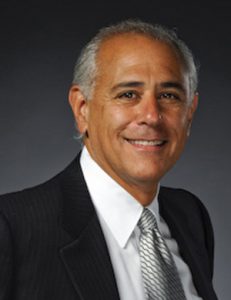
Attorney Ronald E. Gluck
Breakstone, White & Gluck successfully resolved a mild traumatic brain injury case for our client, who was injured when heavy snow collapsed from a commercial warehouse roof onto her vehicle. During the recent jury trial in Middlesex Superior Court, Attorney Ron Gluck presented testimony from multiple expert witnesses including a neurologist and a meteorologist, who testified in support of his client’s case.
Four days into the trial, the defendants made an offer that represented an 800% increase from the pre- trial offer and the case was settled at that time, just before it would have gone to the jury for deliberation. The settlement provides significant compensation for the injuries and damages that our client suffered.
Defendants
Attorney Gluck presented evidence showing that the three defendants – the property owner, the property management company, and the company that leased the warehouse – took no action to remove snow from the warehouse roof and awning following 20 to 24 inches of snowfall. Defendants had a duty to provide a safe environment for those legally visiting the property, such as our client who was making a delivery to the loading dock at the time of her injury.
Trial and Litigation
Through extensive depositions taken during the litigation it was proven that the defendant corporations failed to establish policies for snow removal from the awning, which was located directly above the loading dock, and that none of the employees of the defendant corporations had any understanding of whose responsibility it was to remove snow from the roof. As a result, snow remained on the awning after a historic snow storm and fell onto the liftgate of plaintiff’s vehicle which slammed down onto her head, causing her injuries.
At trial, it was proven that our client was instructed to park her car directly below the awning in spite of the fact that the defendant was aware that snow had fallen from the awning onto the loading dock on prior occasions and that they knew it presented a danger to anyone standing under that awning.
The evidence presented at trial established that our client suffered a traumatic brain injury which caused multiple symptoms including memory loss, mood alteration, dizziness, headaches and involuntary movement of her limbs. She underwent a long regimen of medical treatment for her injuries.
Settlement
At the beginning of the trial, the defendants denied that they were negligent and that their negligence caused our client’s injuries. But, as the trial proceeded and Attorney Gluck presented evidence, the defendants’ settlement offers grew each day until the case was settled on day four.
Breakstone, White & Gluck – Free Legal Consultation: 800-379-1244
Breakstone, White & Gluck is known for our exemplary trial experience. Not every case can be or should be settled out of court. When our attorneys go to trial, we do so with the respect of our colleagues and judges, bringing over 100 years combined experience before Massachusetts trial and appeals courts. We are known for our successful outcomes and for holding defendants, from individuals and insurance companies, to the MBTA and corporations, accountable for their negligence to our clients.
At Breakstone, White & Gluck, each of our partners has over 35 years of experience representing clients in serious personal injury claims in Massachusetts. Our attorneys have successfully presented our clients’ cases before the trial courts, the Appeals Court and the Massachusetts Supreme Judicial Court.
If you have been injured, we can advise you on whether you may have the legal right to seek compensation. For a free legal consultation, contact us at 800-379-1244 or 617-723-7676 or use our contact form.
After Infant Deaths, Fisher-Price Rock ‘n Play Sleeper is Recalled
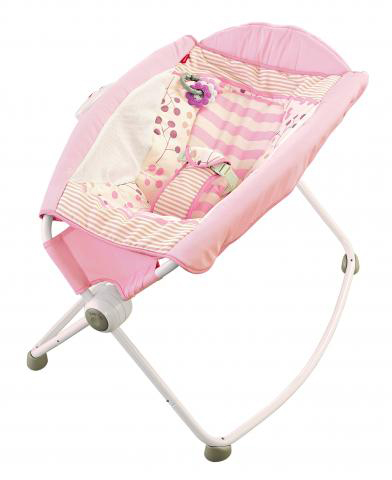
Fisher-Price has recalled its Rock ‘n Play sleeper after an investigation found more than 30 infants died while using it.
It once looked the perfect place to nap and cuddle. But this adorable product – the Fisher-Price Rock ‘n Play Sleeper – wasn’t ever safe. Fisher-Price and the Consumer Product Safety Commission (CPSC) announced the recall of 4.7 million sleepers on April 12, 2019. Parents are being urged disassemble the sleeper and stop using it. The company expects to spend the next several months processing recalls.
Prior to the company’s action, the American Academy of Pediatrics (AAP) had joined Consumer Reports in calling for the product’s removal, stating the Fisher-Price Rock ‘n Play failed to comply with its recommendations, which state infants should only sleep on flat and firm surfaces. Further, the AAP advises infants should not be left on the same surface as other bedding, toys or bumpers, which could increase the risk of infant suffocation or choking.
Fisher-Price, a division of Mattel, is asking parents to contact the company for a refund or voucher toward another Fisher-Price product. The company will offer a full refund for Rock ‘n Play sleepers purchased during the past six months.
Resources:
Fisher-Price Rock ‘n Play Recall Notice, Consumer Product Safety Commission
Mattel and Fisher-Price Recall Page for Parents
The Week of Bad Headlines for Fisher-Price
Fisher-Price and the CPSC announced the product’s recall on Friday, April 12th, following days of pressure from safety organizations. Fisher-Price had initially resisted.
On April 5, the CPSC and Fisher-Price released an initial warning and announced 10 infants had died in the Rock ‘n Play between 2015 and 2019. The infants were all 3 months or older and died after rolling over from their back to their stomach or side.
At that point, there was no recall, but parents were advised to stop placing children in the sleeper once they reach 3 months old, or earlier if they begin turning themselves over.
Days later, Consumer Reports came out with a troubling report linking the product to not 10, but 32 infant deaths since the 2009 release. The consumer watchdog called on the CPSC to immediately issue a recall of the defective product. In response, Fisher-Price said the company did not believe any of these deaths were caused by the sleeper. Rather, the company said medical and health conditions were cited as the cause in some deaths, and in other cases involved improper use of the sleeper.
Shortly after, Americans heard from the AAP: “This product is deadly and should be recalled immediately.”
Despite the AAP recommendations, Fisher-Price managed to introduce the Rock n’ Play and sold it for a decade. Before the recall, it was selling for $40 to $149 at various retailers. The product sits elevated in a canopy-like environment for sleeping and sitting and featuring a “motorized rocking motion” and musical tunes. The problem is when a baby’s head falls forward or sideways. This can block the child’s access to oxygen.
Parents should do careful research when buying children’s products. Monitor the CPSC website for warnings and recalls, as well as the Consumer Reports website. We can expect to hear more about the dangers of other sleeper products in the near future, as Consumer Reports continues its investigation. On April 11, it reported on four other child deaths linked to Kids II sleepers.
More Reading:
Fisher-Price Rock ‘n Play Sleeper Should Be Recalled Immediately, Consumer Reports
Fisher-Price Rock ‘n Play Recall, New York Times
Buying Safe Toys, Breakstone, White & Gluck Project KidSafe
Contact the CPSC About Dangerous Products and Injuries
If you are ever injured while using a consumer product, you should contact the CPSC to report the injury. The CPSC is the federal agency responsible for overseeing the recall process, releasing warnings to the public and collecting injury data. The CPSC works with manufacturers to issue product recalls.
Free Legal Consultation – Contact a Boston Product Liability Lawyer
If you have been injured, it is also in your best interests to consult a Boston product liability attorney. At Breakstone, White & Gluck, our Boston attorneys have represented clients injured by defective products, medical devices and vehicles. Prompt investigation is necessary in product liability cases and our attorneys are known for our thorough, detailed and capable investigation.
For a free legal consultation, contact our lawyers today at 800-379-1244 or 617-723-7676 or use our contact form.
Lynnway Auto Auction and Company President Facing Manslaughter Charges in 2017 Crash Killing 5 People
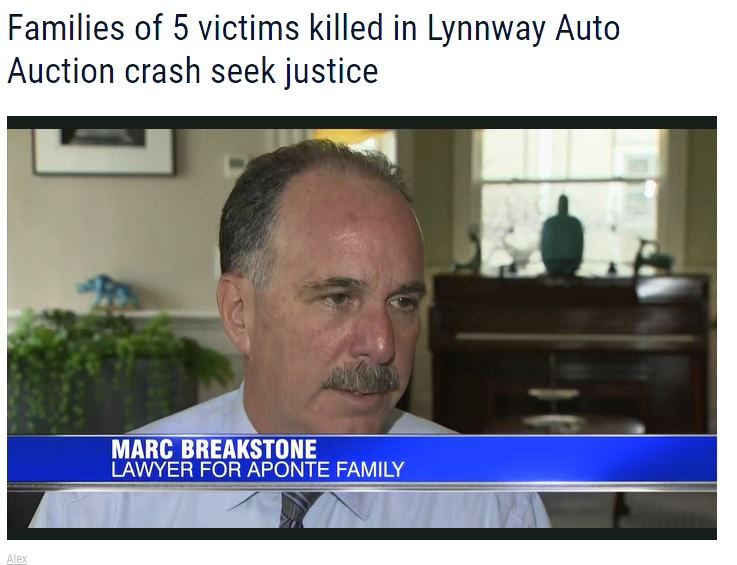
Attorney Marc L. Breakstone, who is representing a family who lost a loved one in the Lynnway Auto Auction crash, speaks to WHDH TV in Boston. Watch.
Attorney Marc L. Breakstone was interviewed by WHDH TV yesterday, following the announcement that the Lynnway Auto Auction, Inc. and company president James Lamb will each face five counts of manslaughter in the 2017 crash killing five people. Breakstone is representing one of the families who lost a loved one.
“This goes beyond normal everyday negligence,” he said. “This was gross negligence that created a dangerous environment for employees and others at the auction.”
Watch the interview on the WHDH website.
Massachusetts Concussion Legislation Would Ban Students In Grade 7 or Younger from Playing Football
Should students have to wait until they finish 7th grade to play football in Massachusetts? Lawmakers are being asked to consider legislation to delay the start of play to protect players from concussions.
“An Act for No Organized Head Impacts to Schoolchildren,” has been filed by State representatives Paul A. Schmid III (D-8th Bristol) and Bradley H. Jones Jr. (R-20th Middlesex). The legislation would ban children in 7th grade or younger from playing or practicing any form of organized tackle football. Schools would be held accountable and face fines for violations:
- $2,000 for each violation
- $5,000 for subsequent violations
- $10,000 when serious physical harm result to participants
Children would be allowed to play flag football or any form of football which does not involve tackle play. The proposal does not include any other sport.
Causes of Concussions
The Centers for Disease Control and Prevention (CDC) define a traumatic brain injury (TBI) as a disruption to the brain caused by a blow or jolt to the head. Concussions are considered a mild TBI, which can result in a brief change of mental alertness or consciousness. A severe TBI can result in a longer period of unconsciousness or mental change.
Symptoms may not be immediately evident after a concussion, especially if the person or those around them are not familiar with the symptoms, which can include an inability to think clearly, memory problems, feeling dazed and mood, behavior or personality changes. Headaches, nausea and vomiting can also set in.
Beyond the sports field, falls are the leading cause of concussions, according to the CDC. Adults over age 65 and children under 14 are most likely to suffer a fall leading to a head injury. Car crashes are the third leading cause of concussions, followed by being struck in the head by an unspecified object, such as in a construction site accident or by violence.
Concussions can also happen on the sports field. Not every contact necessarily results in a concussion, but to identify injuries, Massachusetts and other states have already passed concussion education and training laws. Known as “return to play” laws, these require high school and middle school students to be examined by a medical professional before they can participate in sports again.
Research on Concussions and the Impact on Younger Football Players
New research shows there is a measurable impact when younger children play football. In a study of 26 football players – all age 12 – Wake Forest researchers found changes in the corpus callosum, which joins the two sides of the brain and integrates cognitive, motor and sensory functions. The players underwent MRIs to examine the changes prior to the three-month season and three months after the season concluded. They were compared to 22 other students who did not participate in contact sports.
Players who suffer a concussion need proper rest and treatment so they can properly heal and to reduce the chance for another injury. Researchers have documented this risk; one study found high school and college students who sustained concussions were four to six times more likely to suffer a second injury (Source: McGill University in Montreal).
Concussion Legislation Filed in Other States
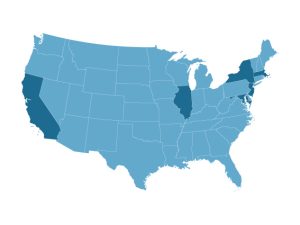
Lawmakers in Massachusetts and five other states have proposed banning tackle football for children younger than 12 or for those in seventh grade or younger. Data from Shape America.
Massachusetts isn’t taking the field alone on concussions. At least five other states are also debating tackle football bans for children under age 12. These states include Illinois, California, Maryland, New York and New Jersey, according to Boston.com. But none of the proposals are on track to reach state governors.
All 50 states already have “return to play” laws aimed at reducing youth sports-related concussions, according to the National Conference of State Legislatures. Washington state was the first to pass such a law in 2009. By 2015, every other state had enacted a similar law.
In most states, these laws mandate concussion awareness training and education to prevent concussions among student athletes. According to Shape America, 48 states require students suspected of having concussions to sit out at least 24 hours.
Arizona and South Carolina allow students back on the field the same day with a doctor’s approval.
Passed in July 2010, the Massachusetts concussion law requires parents, volunteers, coaches and school nurses to receive specialized concussion awareness training. This is to help them recognize concussion symptoms and help students receive treatment as soon as possible.
As in other states, the Massachusetts law requires medical clearance before students can return to sports. Schools are then required to maintain detailed record-keeping related to a student’s injury and progress in the classroom and on the field. The law is M.G.L. ch.111 §222. The Code of Massachusetts Regulations is 105 CMR 201.000.
All middle and high schools which offer sports through the Massachusetts Interscholastic Athletic Association (MIAA) must follow the concussion safety law.
New Report on Electric Scooter Injuries as Massachusetts Considers Regulations
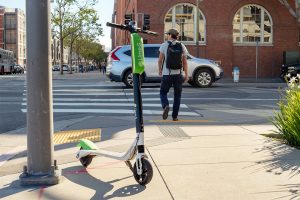
Electric scooter parked on a sidewalk. Seven scooter companies have expressed interest in coming to Massachusetts, according to the Metropolitan Area Planning Council (MAPC).
If proposed legislation passes, electric scooter rentals may soon return to Massachusetts. Bird – a start-up scooter company – flew in and out of the state last year on a failed test run.
Since then, many communities have been discussing regulations locally while waiting for action on the state level. Last month, Gov. Charlie Baker delivered, including electric scooters in his road safety bill, calling for regulations similar to bicycles. Like cyclists, scooter riders would be required to wear helmets to protect themselves from head injuries.
As it stands, electric scooters are regulated more like mopeds and must have blinker lights under M.G.L. ch.90 §1E. Bird did not equip their scooters with blinkers.
Bird caught Cambridge and Somerville off guard last summer, setting out dockless electric scooters on sidewalks for rent – without permission or any approval process. The cities responded with cease-and-desist letters. As Bird packed up its scooters, city officials began discussing how to regulate the scooters locally. But the conversation only went so far because of state law.
In its first year, Bird pushed hard into 100+ cities around the world, surpassing 10 million rides, according to Wikipedia. Bird left Massachusetts last year, but it’s likely to return one way or another. The company has taken legal action against Beverly Hills and other communities with scooter bans.
The Impact of Electric Scooters on Safety
The industry is closely following the proposed legislation in Massachusetts. In addition to Bird, six other companies, including Lime, Uber and Lyft, have expressed interest, according to media reports.
Scooters are the next step for rideshare and bike share companies (In fact, Bird was founded by a former Uber and Lyft executive; Lime counts Uber and Alphabet – Google’s parent company – as investors. And Uber and Lyft themselves are interested in their own right).
Scooters are an affordable way to travel, with rides costing even less than subway fare. Anyone with a mobile phone can sign up and unlock a scooter for about $1.00; from there, the ride is about 15 cents per minute.
Scooters may help alleviate some traffic congestion, but they will also increase pressure in many areas, such as Somerville and Cambridge, which have high counts of pedestrians and cyclists. Other states are seeing accidents and we will likely see more car accidents and truck accidents in Boston and across the state, regardless of the skill, leadership and collaboration local and state officials bring to the process.
Although companies may mandate helmet use in the fine print, many people will end up riding without helmets.
One important step will be educating drivers on how to travel near scooters and understand the scooter’s capabilities. Many drivers may expect blinker signals and will have to get used to the battery-operated motorized pace of scooters.
Educating scooter riders is just as important. While motorcyclists have to study up and earn a special license, scooter riders can decide on a last-minute impulse to try a scooter. And when someone decides to take a scooter ride at the last minute, they are more likely to ride without a helmet. Helmets are not included in the rental, either.
Before you consider riding a scooter, take time to plan. Keep a helmet at home and at work if there is a chance you may use a scooter. Take a class to learn how to ride in a safe area, such as an empty parking lot. Finally, ask your insurance agent if you have enough auto insurance should you be injured on a scooter. This is critical because the driver who hits you may not stop or may not have enough insurance to cover your injuries.
Consumer Reports Publishes E-Scooter Injury Data
Consumer Reports recently reported Bird and Lime, the two largest electric scooter companies, reported just 470 scooter accidents between the fall of 2017 and July 2018. Both California-based companies were founded in 2017.
Consumer Reports conducted its own “spot tally” and found there were actually an estimated 1,500+ people were injured in e-scooter crashes (Source: “E-Scooter Ride-Share Industry Leaves Injuries and Angered Cities in its Path”). Consumer Reports surveyed 110 hospitals and five police departments or public agencies in 47 cities where at least one of the companies operated. Outside its survey, Consumer Reports at least 4 people have been killed on electric scooters, including a 21-year-old man in Austin, Texas on Feb. 2. The man was on his scooter, traveling in the wrong direction when a Uber driver changed lanes to exit and struck the man and his Lime scooter.
An important note on the Consumer Reports survey: At this point, about 62 percent of the hospitals and agencies reported they had no scooter reports or they don’t track scooter injuries or they don’t have the capability to track injuries.
A doctor in Bloomington, Ind. reported he treated serious injuries, included multiple concussions, facial fractures and bilateral forearm fractures. In some cases, patients required surgery for their electric scooter injuries.
Another doctor estimated he had treated 20 patients after electric scooter crashes. Not one wore a helmet, except for his own son. Consumer Reports reported experts were concerned about the availability of helmets because not every rider carries a helmet or plans to use a bike rental (for its part, Bird told Consumer Reports it has given away 65,000 free bicycle helmets and strongly encourages helmet use).
Consumer Reports is not the only one speaking up about electric scooter safety. Last October, a class-action lawsuit was filed against Bird, Lime and other scooter companies. The lawsuit was filed in Los Angeles Super Court and alleged the companies were “aiding and abetting assault” by contributing to injuries sustained from collisions with scooters. Three of the eight initial plaintiffs said they were pedestrians who were hit from behind by scooters. One victim reported the scooter hit him and kept going. This was reported by L.A. Biz.
Victims said the scooter companies were negligent because they should have known their vehicles would be a dangerous “public nuisance.” Bird and Lime were named, with the victims calling their safety instructions inadequate while the scooters themselves had mechanical issues. The complaint also claimed the companies have breached the warranties on the scooters and they are not suitable for repeated use by the public.
Companies Taking Massachusetts Dockless with Bike and Scooter Rentals
The “dockless” part of scooters will also impact safety. Without the docks, riders can just leave scooters wherever they want, on the sidewalk or even on the side of the street. Fortunately, the Boston area already has some experience with bikeshares and dockless transportation.
Blue Bikes offers bikeshare rentals in Boston, Cambridge, Somerville and Brookline. First arriving in Boston in 2011, the program now offers 2,500 bikes at 262 bike docks. Beyond these communities, the price tag of those bike docks have stalled the program’s growth.
That’s where companies such as Ofo and Lime have stepped in with dockless rentals. Rather than pedaling to a dock, riders can lock bikes up wherever they choose. If another rider is in the area, they can find the bike on the company’s mobile app. The company is supposed to collect bikes at the end of the day.
Ofo set up in Worcester and Quincy last year, then quickly retreated. The Metropolitan Area Planning Council (MAPC) chose Lime and Spin to provide dock-less bike share services in 15 communities last year. Spin later announced it was going to focus on electric scooter rentals, rather than bikes.
Communities working with MAPC and Lime: Arlington, Bedford, Belmont, Chelsea, Everett, Malden, Medford, Melrose, Milton, Revere and Winthrop. A little farther west, Needham, Newton, Waltham and Watertown all participated.
As for scooters, Boston, Cambridge, Somerville and Brookline are expected to operate a regional scooter system. We will have to wait and see on other communities.
About Breakstone, White & Gluck – Free Legal Consultation
Our Boston personal injury lawyers have over 100 years combined experience representing individuals injured by car accidents and truck accidents in Massachusetts. If you have been injured, learn your rights for seeking compensation. Our attorneys have been recognized by Top 100 New England Super Lawyers, Top 100 Massachusetts Super Lawyers and Best Lawyers in America. We are here to help you. Free consultation: 800-379-1244 or 617-723-7676 or use our contact form.


